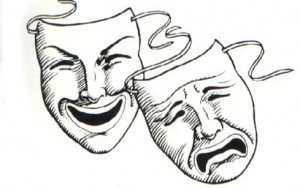
Once upon a time my family was taking a trip by train and trudging across Eastern Europe. Apparently we were feeling that Poland in the winter was just a little bit too cheerful so we decided to visit the former Nazi concentration camp Auschwitz. Despite my pretensions to confidence and my youthful indifference, I along with the rest of my family felt deeply saddened and horrified by this enterprise. We didn’t talk much on the walk back to the train station, but we did agree that we should probably eat at one of the local restaurants before making the train ride back down toward Austria.
Our conversation was about as desultory as before, until one of us remarked on the tourist industry that Auschwitz now supported. My brother, responded by saying, “Yeah, its one of the few tragedy-based economies.” In a style fairly typical of my family, we were all reduced to peals of shaking laughter. It was a great catharsis; a glorious moment of accepting grief and simultaneously recognizing the absurdity of it. It did not cheapen the experience nor artificially mitigate our grief.
The distinction and relationship between laughter and grief has always been unclear. Yet the act of someone deeply embroiled in despair, consumed in tragedy, giving over to unexpected laughter seems to be a fairly common occurrence.Sometimes, in more trivial circumstances, I find myself simply laughing at my own misfortune, skipping the process of tragedy entirely. Sometimes the two do not seem linked, but we laugh and we cry separately and perceive little connection between them. However, I believe that even in these subtle circumstances where we perceive little commonality between the comedic and the tragic, they are still inexorably linked. The only way to understand this link is to understand these individual responses. In other words, we must first understand what is tragedy and what is comedy.
Tragedy has always come to me through absurdities. The world is an unjust place; it dispenses perdition and fortune capriciously and without reason. What makes an event tragic is the senselessness of it. We cry over an old woman dying, but it is not a tragedy; it is the inescapable end to a long life. We cry because of what we have lost, but not the nature of our losing it.
The death of a child or a young adult is, however, a tragedy. For in an organized universe, such a thing would not happen. In an organized universe, people would fulfill their potential, keep the whispering promises made by their births and live a full and complete human life. However, we must constantly confront the fact that our universe is not organized in this way. What happens to us is indeed senseless. Tragedy is what comes to us in the perception of absurdity; it is when we recognize it but we hate it.
Comedy has also come to me through absurdities. My favorite moments in Seinfeld or Curb your Enthusiasm are typically when some great absurd confluence of characters and plot lines create events impossible to have predicted beforehand. All of the things I have laughed at and treasured most were comedians and writers who could most cleverly create and satirize absurdities: Dave Chappelle playing the crack head Tyrone lecturing a classroom full of kids about drugs and their merits; Calvin, from Calvin and Hobbes, giving some long winded philosophical lecture while hurtling over the edge of a cliff. Comedy is the acceptance of absurdity.
Only through comedy do we make ourselves the superiors of absurdity. We make the senselessness of the universe into a contemptible entity and through that we can accept it.
This is why the two concepts are so importantly linked. We must have tragedy because the universe is absurd and we must have comedy because that is the only way absurdities can be accepted. To have one without the other is unsustainable. Perhaps if our species was without its pretensions of organization and of justice, comedy and tragedy would be superfluous.
But, because we have these ideals so strongly ingrained, we need both. Without tragedy, comedy would be a shallow and ineffectual enterprise; the absurdities confronted could be only minor and trivial. And without comedy, tragedy would be unrelenting in its torment; there would be no peace and no acceptance, only the persistent query of “why?”